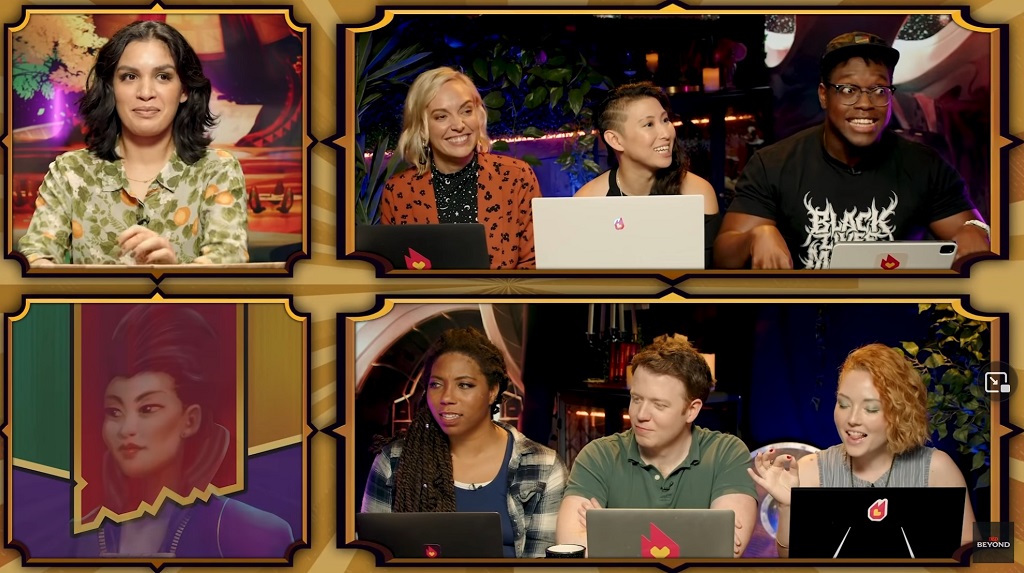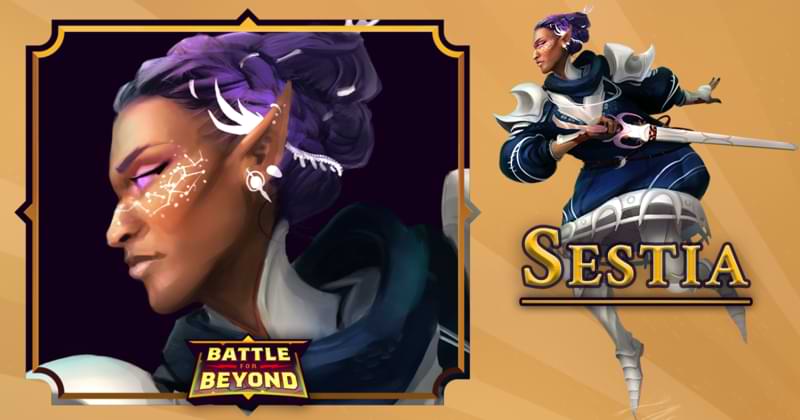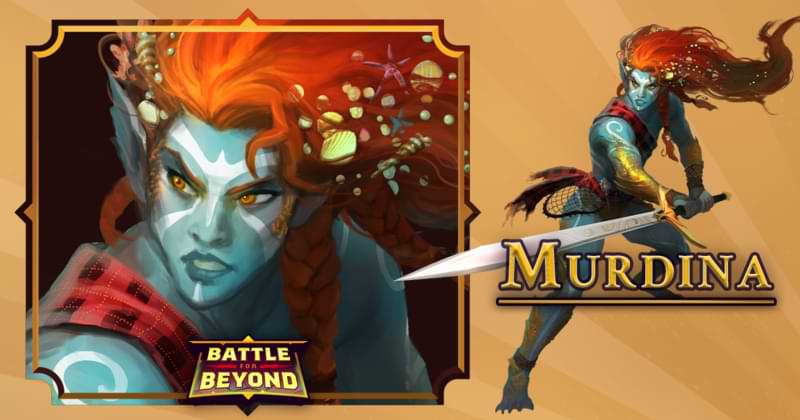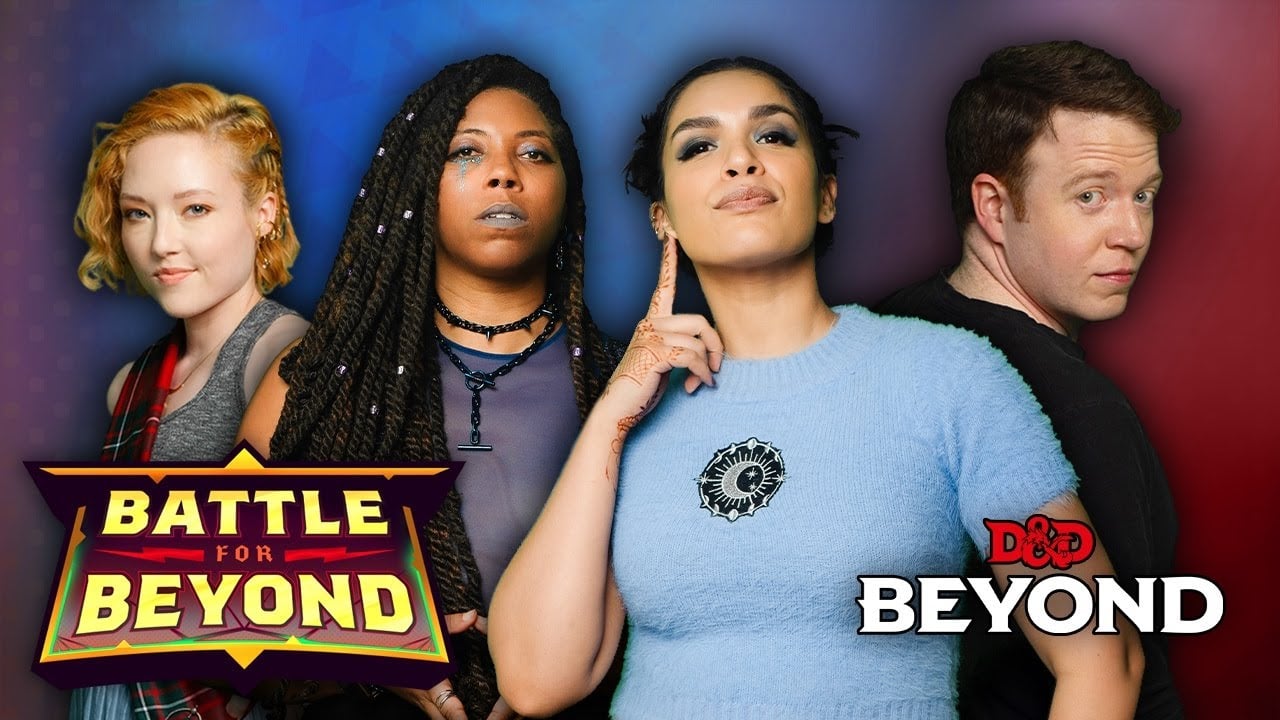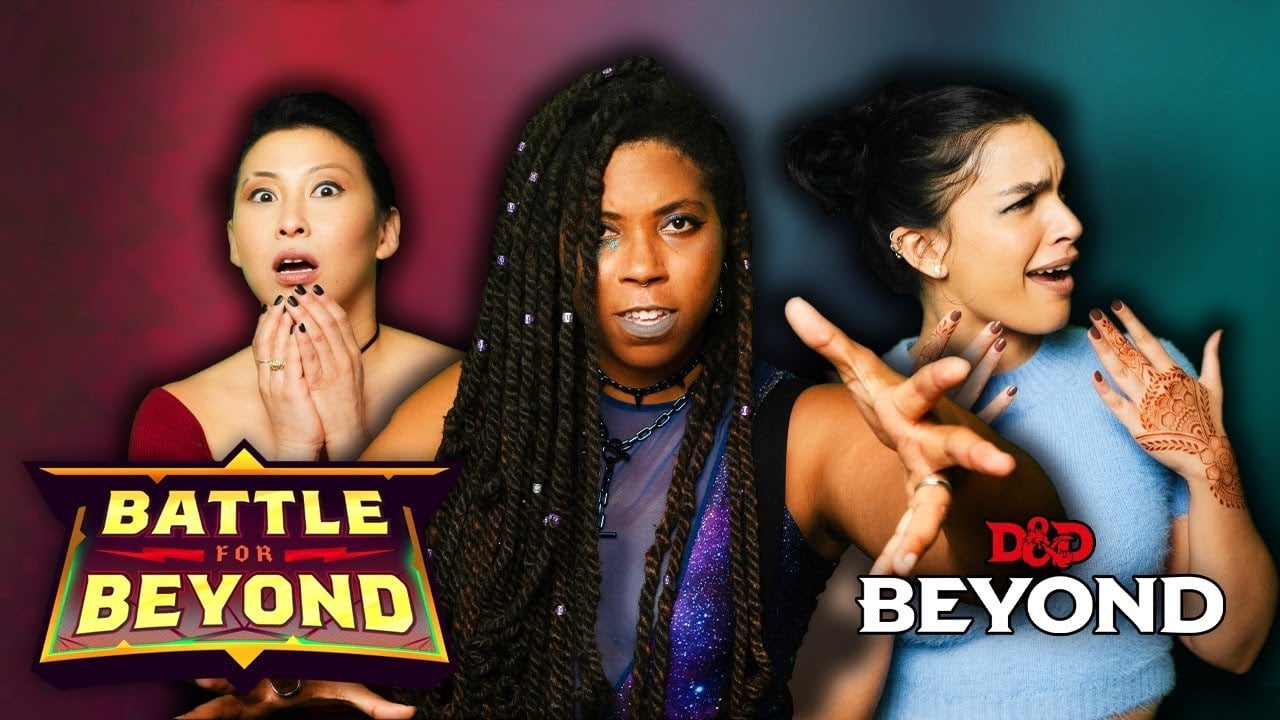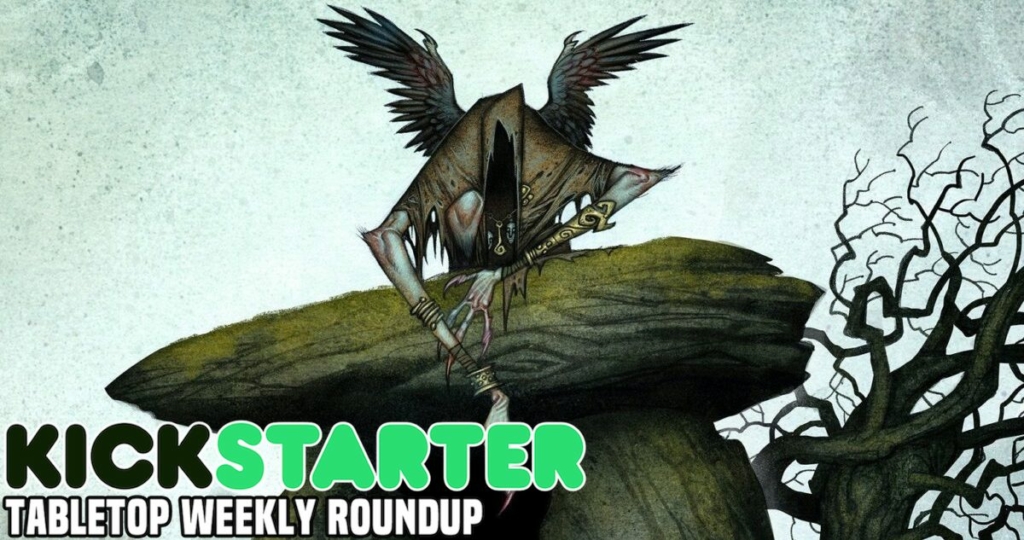D&D: The Battle For Beyond Talk About D&D And… Beyond
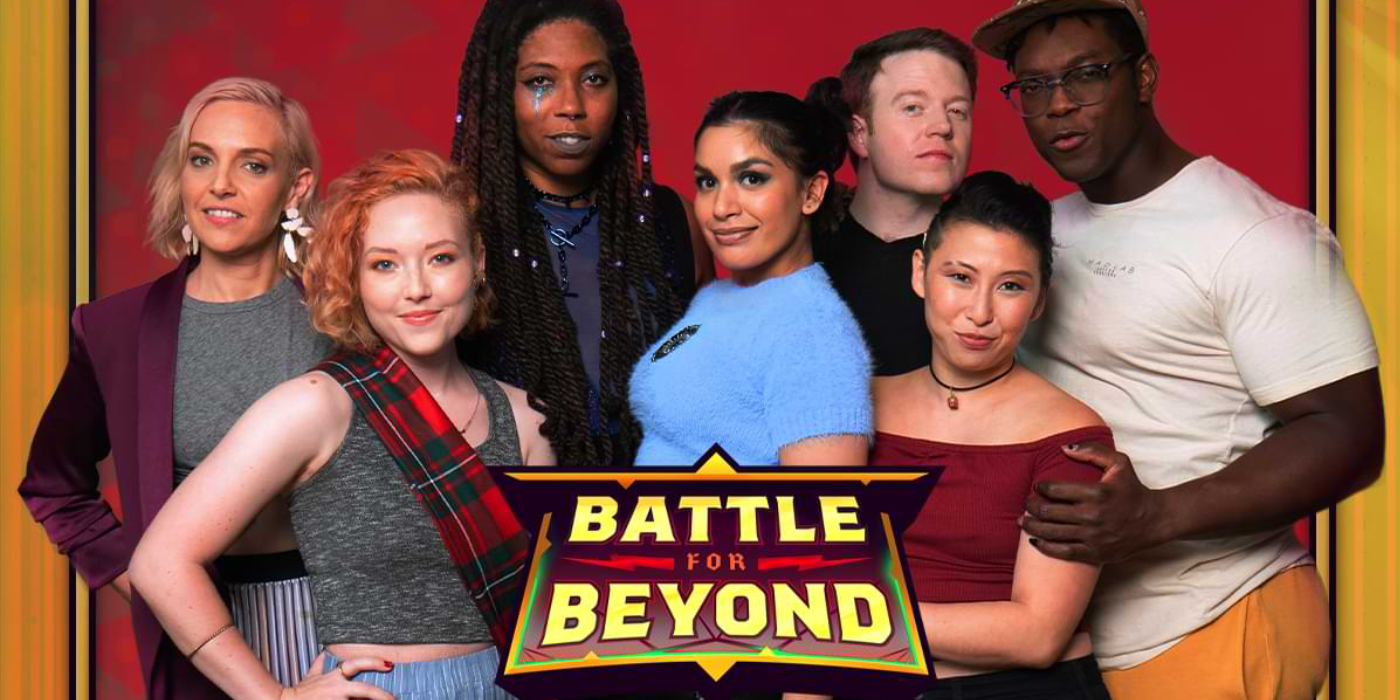
With the Battle For Beyond hitting its epic conclusion today, we caught up with the cast to talk D&D and… beyond.
The rise of D&D over the past seven years is inextricably linked with the rise of actual play D&D games. Stranger Things too, for sure. But just as many people who’ve never played a game of D&D can tell you all about it because they’ve watched other people playing.
Back in 2017, Wizards of the Coast estimated that over half of the people who got into D&D got into it through watching people play online. And that was four years ago.
The Growth of Actual Play Games
As a concept, actual play games of D&D has been around since 2008, at the launch of 4th Edition. In the ensuing thirteen years, AP games have come a long way.
There have been games/shows focused on playing by the rules, comedy D&D podcasts, wizard-school games. The sheer number and variety of actual play shows is staggering.
And it’s going to keep going too. With D&D’s new Invitation to Party show on G4 TV, and an audience that keeps growing exponentially, it feels like actual play games are turning a corner.
Whose ready for tomorrow's #battleforbeyond finale? While we wait let's appreciate some of these AMAZING #BTS photos.
📷: @TheCameronRice
⚔️ Catch Up With the Battle For Beyond Playlist: https://t.co/VioAFycK9k pic.twitter.com/caGJTU1Zwm— D&D Beyond (@DnDBeyond) December 16, 2021
Advertisement
We caught up with some of the cast and crew of Battle for Beyond. If you don’t know it, it’s a six-part Battle Royale mini-series on D&D Beyond that has done so much in just five short sessions.
And while the twists and turns of the game are surprising, it’s not surprising at all that “a Battle Royale” would be so much more complex. Especially with the powerhouse crew of tabletop heavy-hitters put together for the show.
We talked with those heavy hitters about creating such an enjoyable show, D&D in general, and where things seem to be headed.
Battle for Beyond blended cooperative and competitive styles of play from the outset. That’s a delicate balance to maintain, how did that come to be? What considerations go into creating a campaign where the players are ostensibly pit against each other? Or creating a character you know might be fighting the others?
Jasmine Bhullar (DM): It started with Joe (Starr of Fandom) coming to me with the overall conceit of the campaign, which was this Battle Royale style game. I asked how much of my own spin I could put on it, and Joe gave me the freedom to infuse some of those cool narrative elements in it, and over the course of it, it really morphed into something bigger than I think either of us expected. The scope of it was a lot more narrow than what it ended up being, which was this very big sweeping narrative encompassing all of these interesting characters.
As the players came forward with them, to me it became very clear that this wasn’t just going to be a competition, that it was very quickly going to morph into something more.
Aabria Iyengar (Sestia): The initial concept we were pitched on was this Battle Royale. And the dual meanings of that, of this big huge battle and then ‘wait…are we gonna fight each other? Hold on.’ I have the joy of knowing everyone on the cast, and so I would ask ‘what are you building? Oh cool cool cool, multiclass huh? No reason’. Of course getting into the actual game, you realize the emotional connections everyone built right away built a feeling of ‘are we still gonna fight?’ And that tension remained a great throughline throughout the other beats of the emergent narrative.
There was really never a point where I thought ‘okay cool, we’re not gonna fight.’ The entire time, my only goal was, I will not get dropped by Brennan.
Josephine McAdam (Murdina): I think I was the last one to join the show, so by the time I arrived everyone had already had their characters. Which was great, because I like to see what everyone else brings and build off of that. In this case, I wanted to find someone who would be ready to go along with whatever–are we fighting? Great. Are we on a team? Great. So I thought, what’s missing is the classic fighter.
My dad’s Scottish and I grew up in that culture. I feel like in the U.S. everyone thinks of Braveheart, they think of these tough warriors. But there’s also this thriving folklore in Scotland as well. Especially with the Triton–I saw the Triton and thought, well there’s so much about selkies and mermaids and lots of different stories that I can pull from to create this mesh between the two.
I was looking at Alexander McQueen runways–he’s a designer who could take designs that have grittiness to them and add this softness to them. And mermaids are always alluring and soft OR you’re a tough warrior on the isles; I wanted to find a way to bring all of that together with Murdina.
Joe Starr (Producer): When we were talking about the concept early on, I think collegiate wrestling is cool and impressive, but as a viewer, I watch pro wrestling every time. You need to be invested in character, you need to be invested in story to be invested in the premise. I think it’s why people really connected with Squid Game and then looked at the YouTube recreation and it doesn’t land the same way, because you’re not invested in the story being told.
When you want someone who can come in hard with story and a world and themes and ideas, you call Jasmine. 99% of my job was emailing Jasmine.
What goes into encouraging and fostering the chemistry that it takes to get those kind of team dynamics in a game like this?
Jasmine: [The team dynamics] originally came up because of a scheduling conflict. But it quickly turned into something I really wanted to do, which was having the players come in three at a time in the first two episodes. I really wanted each character to have face time with the audience.
One of the challenges with a mini-series if taking these really rich characters that are fleshed out, and making sure the audience gets to know more about them because that investment is so important. But when you have six players at the table, each of them needs time. Especially in the case of Battle for Beyond, we need to know “What drives someone to go to the end of the universe and participate in a competition to get one wish?”
And the other part of it was, I kind of wanted old school NWO style rivalry, where it’s like “are you NWO white and black or are you red and black?” And in order to push that team idea where you know eventually there can be only one, but maybe we have to work together to get there–I could not have anticipated that it would work out as well as it did.
Because when Aabria and Josephine and Brennan sat together, I could tell exactly what Aabria was talking about, that looking over my shoulder of “what is this guy gonna do?” But the second there were three strangers in the room, they were immediately “we’re a team now.” Now it’s us vs. you.
Aabria: I think the only hard part was living in that world where I’m looking over my shoulder at the rest of the table, but I just want Jasmine to describe the rest of the world to me in aggressive detail.
I want to shout out the moment in episode 4, where we got just enough information about Leila (Erika Ishii’s character) to cast that little bit of doubt and I fully thought we were gonna throw hands then and there. And then watching Ify [Nwadiwe] come in with Ekon and immediately stand up for her. It was this wonderful moment of not knowing what’s going to come next.
Josephine: I think there’s a big difference in how I go about a streamed game vs. a home game. [For a streamed game], I tend to think more in terms of character arcs. Especially if I know there’s a set number of episodes. I do a lot of homework, with streams.
Of course I don’t know what the DM is going to do, but I try to think more in terms of arc and trajectory. It’s all malleable but knowing how I feel about each person at the table makes for a very grounded and fuller character. And if I know my character: how they think, who they like, things they agree with and don’t, then whatever gets thrown at me, I know how they’ll respond in the moment, and it’s not me coming through. Whenever I’m performing a character I know people are going to be watching, I like to have a very hard line between myself and the character.
Especially because I do like to pursue romantic storylines or really heavy, sad things.
Joe: In terms of the production side we were sort of flailing and screaming right up to shooting on the first day. I know a few people were checking in, but aside from having drinks the night before, really, everyone just jumped right in. We didn’t have a session zero. We put together a cast we could trust and said “hey, we trust all of you to make big choices and go for it. You have six episodes. Make big end of campaign choices, and go for it.” And if you can trust any table to do that and not stress out, it’s this table.
I think part of the premise that Jasmine and I kicked around was, “what does a D&D game feel like if our table is on the same page and working together to tell a story, but our characters aren’t?”
Jasmine is probably one of the best DMs in this world of celebrity DMs right now and making those choices inform each other. Everything she does informs story. Watching her make sure everything is driving story, real time, while on top of that juggling the players while saying “okay but I only have two hours to record this session” and watching her weave all that real time is incredible.
And I think because of the way Jasmine really drove story and figuring out those relationships with each other, the moments where everyone’s on the sideline, rooting for each other either way. To punch each other or not. The moments where everyone continued to say “nope, it’s the six of us” always felt so earned and organic because it was never a given. That wasn’t the premise.
You didn’t have a session zero, that’s incredible, given the chemistry between the players. What goes into encouraging and fostering that kind of chemistry/trust at the table, as you’re playing?
Jasmine: It’s one of the only mini-series I’ve run where there was no session zero. But, it helps having a cast like this one. This is the first time I really got to play with Aabria, but I’ve been a fan of hers from afar. Same thing with Erika, same thing with Brennan; I was familiar with their work coming into it. Even though it sounds really cheesy, the cool thing about this table is we’re all legitimately fans of each others. And we all come into this very excited, like “aaah! I finally get to play with you.” And that lets us come in cold but hot. We get to play together, this is so exciting.
Ify and I come from the hosting world. Hosting is a different animal. That is a trust fall. It’s alive, you have to riff off each other. It’s kind of like doing standup. You develop this chemistry and nonverbal communication of when to throw to each other and how to sell a joke.
I found I developed that with Aabria too where we could look at each other and check in, sort of ask “are we gonna make this sad? are we gonna make this funny?” And then just go for it. And it’s great when you are able to do that trust fall.
Aabria: I also think there’s something really cool and interesting about the assignment allowing for a strange, instant chemistry to be built. Session zero and early chemistry meetings are usually for campaign-long planning.
But the added element of “hey maybe you’re going to kill everyone else at the table,” made for immediate connections. There’s nothing more interesting than being like “okay I’m going to make a muppet, and I wonder what everyone else is bringing.” It felt like equal parts storytelling and show and tell. Like “here’s this weird thing I built, what are you gonna do with it?” If the vibes are rancid, and we don’t get along, then that’s fine, we’re gonna be enemies right away and that’s great too.
Everything was so big about this from the jump. Enemies, lovers, friends, there’s nothing but to have big beats and big moments here. And having all of that in the strata of Jasmine’s insanely good storytelling and NPCs that were keeping us moving in a direction and dropping those little bits of lore to keep us in that 3-act structure.
It was just pivot after pivot of “and here’s why everything’s a little bit worse.” Here’s how the world is actually screwing all of you over together now what do you want to do with that? Constantly having those land mines thrown in, made it so interesting to go from “I want to hit you with my druid powers” to “okay wait did you hear that? What are we doing?”
It was so interesting to be constantly reacting in big ways in real time throughout a very short series, and having it not feel like a burnout level of high emotions the whole time. It always felt really good and amazing and incredibly investing.
Josephine: One thing I did was ask to make sure beforehand was “are you okay if I romance or hit on you excessively.” I always make sure that’s okay with players, because I actually like to romance people I’ve never played with before. I think it can be a great way to give you a connection and to let your character cheer for their character in a really loving way.
It’s really interesting because it’s improvised and we don’t know what we’re going. I know not everyone has the same background in acting as me, but I am generally okay with almost anything that can get thrown at me. So it’s just figuring that out with new players.
Aabria and Brennan were very much “absolutely yes, go as far as you want.” But if they had said no, there’s so many things to explore so it’s easy not to do something.
You’ve all been on multiple streams and seen how far we’ve come over the last few years. With that in mind, where do you think gaming and streaming are headed in the next few years? What lies D&D Beyond?
Aabria: I think the very cool thing that we’re experiencing right now is the pushing of form. Where so much of early AP was about capturing the feeling of a home game, but on camera, and we told these boxed high-fantasy adventures, I think we’re leaning in to figure out what kind of interesting stories can we tell? We’re asking “how do we bring elements of horror and discuss philosophy?” We’re trying to get at all the best things about speculative fiction, which resonate with me more than high fantasy–and that’s what’s the thing we can change about the world that helps us investigate what it means to be human.
I think there’s something interesting in D&D specifically, and tabletop roleplaying games in general, where you can reach out and make those changes easily. You can add magic or a different race or an existential monster threat or declare all gods are real, then ask, “what does that mean about where you line up in the cosmos?”
As an audience member, I love watching APs for that reason. It’s something I can’t get with Netflix. It’s improvised, which makes it closer to someone’s heart. And maybe the dialogue is suboptimal, but there’s something so raw and wonderful about taking that first reaction to new stimuli and having to run with it and live with it.
There’s something wonderful about improvisational theatre that’s like “this could only happen at this table with these people and this set of circumstances.” Same with tabletop roleplaying games.
Josephine: I started playing when I was about six years old, my dad DM’d my brother and I when I was growing up. For a while there was this long gap where I couldn’t find anyone to play with, or who knew what D&D was–and then it exploded again.
When Critical Role started, and you see mentions of D&D in Stranger Things, it’s been lovely because now I don’t have to force people to play with me as my one and only birthday wish.
I’m always happy for more people gaming, because I’m always trying to get people to play. I think it’s great that it’s growing. [F]rom personal experience, not everyone wants to perform to a certain level all the time. I love board gaming where I’m not performing at all.
And I wonder if we’re going to see more of those lines appear where people are one camp or the other. I think that’s fine, you should be able to do both.
I hope that what we understand is you can make [gaming] whatever you like it to be. And that’s the beauty of tabletop RPGs, you can fine tune them to be whatever you’d like, and I think we’ll see a lot more homebrewing as people become comfortable enough to venture outside of the ‘learning the rules’ and experiment.
Joe: I hope it encourages more and more people to understand this is what D&D is and what it can do.
When I first told my dad about this, I explained to him “it’s like an improvised audio drama from back in the day, when you would listen to Little Orphan Annie.” I don’t know how old my dad is.
But getting people to recognize, that “oh I can have this experience in my home with my friends, and not only can I, I should” is thrilling. And I hope that it gives more people control over their own worlds when we live in this real world where we have zero control.
Jasmine: I heavily agree with Aabria. I definitely think it’s about less looking at this as a home game, and more thinking about it in terms of what kind of stories can we tell in the space. Originally when we looked at D&D content that was being made on the internet, there was so much of a focus on not just the system being used, but mechanics and rules.
Then we shifted into a renaissance of the focus being just on storytelling. Now I feel like we’re coming back into the gamification part of it, where I think the rules inform how we deal with conflict in a fair and equitable fashion vs. something dispensed out of hand completely or something that’s main the focus of the game. I think we’re finally reaching this amalgam in the middle, which I love because I do focus a lot on encounter design. I come from this old school DM school of how many traps can you put in a dungeon.
But you do not get a room full of brilliant performers and storytellers and have them strategize for two hours. How do you let the roleplay and collaborative storytelling breathe and then still have a puzzle to solve at the end of it? I think if you can do that, you’ve created the perfect campaign.
And then the problem becomes, how do you create this in a format that people can actually keep up with. So that people do not look at the idea of 4 hours every single week and you miss two episodes because you went on vacation and how can you possibly catch up?
With Battle for Beyond, we’re at that perfect length where, there’s enough for you to get invested. There’s enough to give you a full story. We’re not giving you an appetizer, we’re giving you a full meal and hoping maybe you’ll come back and dine again with us in the future.
You can catch the last episode of Battle For Beyond today at 4PM PT/6PM CT on D&D Beyond’s Youtube Channel. Don’t miss it!
Missed the first episode? Want to catch up on the finale? Click here!

